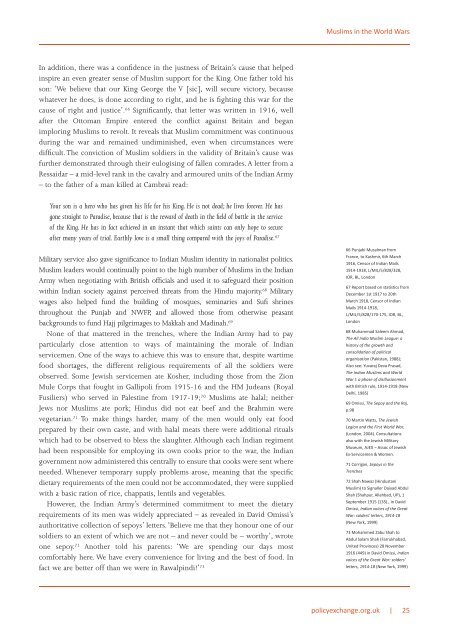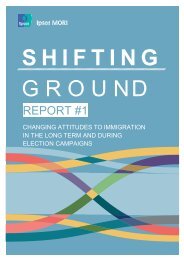You also want an ePaper? Increase the reach of your titles
YUMPU automatically turns print PDFs into web optimized ePapers that Google loves.
In addition, there was a confidence in the justness of Britain’s cause <strong>that</strong> helped<br />
inspire an even greater sense of Muslim support for the King. One father told his<br />
son: ‘We believe <strong>that</strong> our King George the V [sic], will secure victory, because<br />
whatever he does, is done according to right, and he is fighting this war for the<br />
cause of right and justice’. 66 Significantly, <strong>that</strong> letter was written in 1916, well<br />
after the Ottoman Empire entered the conflict against Britain and began<br />
imploring Muslims to revolt. It reveals <strong>that</strong> Muslim commitment was continuous<br />
during the war and remained undiminished, even when circumstances were<br />
difficult. The conviction of Muslim soldiers in the validity of Britain’s cause was<br />
further demonstrated through their eulogising of fallen comrades. A letter from a<br />
Ressaidar – a mid-level rank in the cavalry and armoured units of the Indian Army<br />
– to the father of a man killed at Cambrai read:<br />
Your son is a hero who has given his life for his King. He is not dead; he lives forever. He has<br />
gone straight to Paradise, because <strong>that</strong> is the reward of death in the field of battle in the service<br />
of the King. He has in fact achieved in an instant <strong>that</strong> which saints can only hope to secure<br />
after many years of trial. Earthly love is a small thing compared with the joys of Paradise. 67<br />
Military service also gave significance to Indian Muslim identity in nationalist politics.<br />
Muslim leaders would continually point to the high number of Muslims in the Indian<br />
Army when negotiating with British officials and used it to safeguard their position<br />
within Indian society against perceived threats from the Hindu majority. 68 Military<br />
wages also helped fund the building of mosques, seminaries and Sufi shrines<br />
throughout the Punjab and NWFP, and allowed those from otherwise peasant<br />
backgrounds to fund Hajj pilgrimages to Makkah and Madinah. 69<br />
None of <strong>that</strong> mattered in the trenches, where the Indian Army had to pay<br />
particularly close attention to ways of maintaining the morale of Indian<br />
servicemen. One of the ways to achieve this was to ensure <strong>that</strong>, despite wartime<br />
food shortages, the different religious requirements of all the soldiers were<br />
observed. Some Jewish servicemen ate Kosher, including those from the Zion<br />
Mule Corps <strong>that</strong> fought in Gallipoli from 1915-16 and the HM Judeans (Royal<br />
Fusiliers) who served in Palestine from 1917-19; 70 Muslims ate halal; neither<br />
Jews nor Muslims ate pork; Hindus did not eat beef and the Brahmin were<br />
vegetarian. 71 To make things harder, many of the men would only eat food<br />
prepared by their own caste, and with halal meats there were additional rituals<br />
which had to be observed to bless the slaughter. Although each Indian regiment<br />
had been responsible for employing its own cooks prior to the war, the Indian<br />
government now administered this centrally to ensure <strong>that</strong> cooks were sent where<br />
needed. Whenever temporary supply problems arose, meaning <strong>that</strong> the specific<br />
dietary requirements of the men could not be accommodated, they were supplied<br />
with a basic ration of rice, chappatis, lentils and vegetables.<br />
However, the Indian Army’s determined commitment to meet the dietary<br />
requirements of its men was widely appreciated – as revealed in David Omissi’s<br />
authoritative collection of <strong>sep</strong>oys’ letters. ‘Believe me <strong>that</strong> they honour one of our<br />
soldiers to an extent of which we are not – and never could be – worthy’, wrote<br />
one <strong>sep</strong>oy. 72 Another told his parents: ‘We are spending our days most<br />
comfortably here. We have every convenience for living and the best of food. In<br />
fact we are better off than we were in Rawalpindi!’ 73<br />
Muslims in the World Wars<br />
66 Punjabi Musalman from<br />
France, to Kashmir, 6th March<br />
1916, Censor of Indian Mails<br />
1914-1918, L/MIL/5/828/328,<br />
IOR, BL, London<br />
67 Report based on statistics from<br />
December 1st 1917 to 20th<br />
March 1918, Censor of Indian<br />
Mails 1914-1918,<br />
L/MIL/5/828/170-175, IOR, BL,<br />
London<br />
68 Muhammad Saleem Ahmad,<br />
The All India Muslim League: a<br />
history of the growth and<br />
consolidation of political<br />
organisation (Pakistan, 1988);<br />
Also see: Yuvaraj Deva Prasad,<br />
The Indian Muslims and World<br />
War I: a phase of disillusionment<br />
with British rule, 1914-1918 (New<br />
Delhi, 1985)<br />
69 Omissi, The Sepoy and the Raj,<br />
p.98<br />
70 Martin Watts, The Jewish<br />
Legion and the First World War,<br />
(London, 2004). Consultations<br />
also with the Jewish Military<br />
Museum, AJEX – Assoc of Jewish<br />
Ex-Servicemen & Women.<br />
71 Corrigan, Sepoys in the<br />
Trenches<br />
72 Shah Nawaz (Hindustani<br />
Muslim) to Signaller Daiyad Abdul<br />
Shah (Shahpur, Allahbad, UP), 1<br />
September 1915 (135)., in David<br />
Omissi, Indian voices of the Great<br />
War: solders' letters, 1914-18<br />
(New York, 1999)<br />
73 Mohammed Zabu Shah to<br />
Abdul Salam Shah (Farrukhabad,<br />
United Provinces) 28 November<br />
1916 (449) in David Omissi, Indian<br />
voices of the Great War: solders'<br />
letters, 1914-18 (New York, 1999)<br />
policyexchange.org.uk | 25



